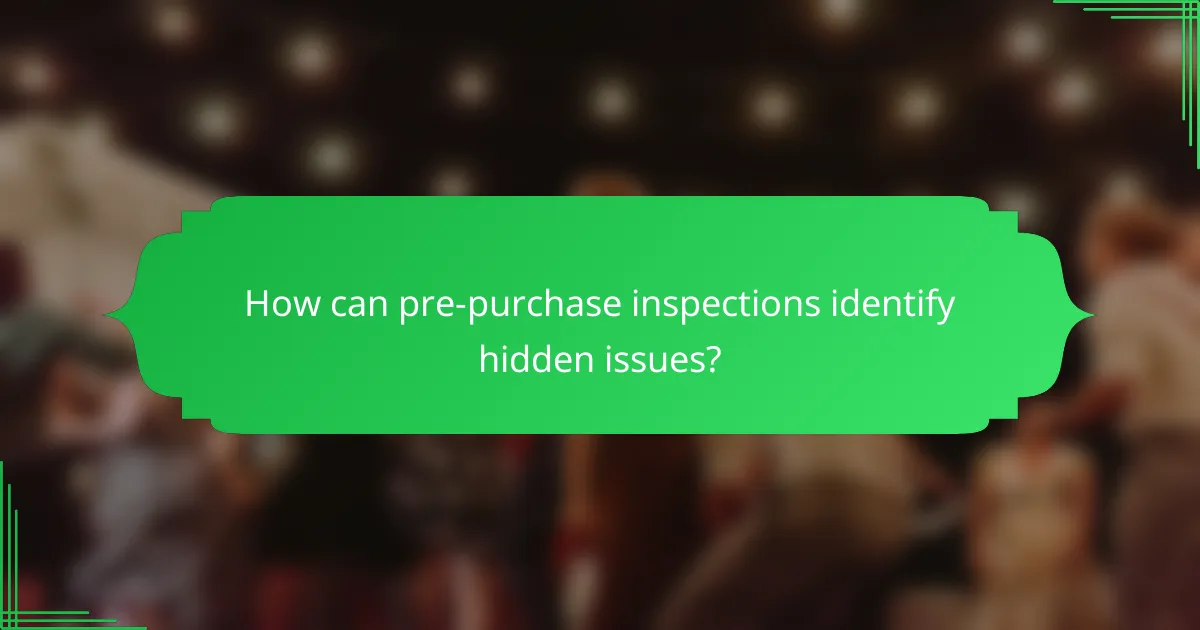Pre-purchase inspections are essential for uncovering hidden issues that may compromise safety and lead to costly repairs. By identifying potential hazards and necessary fixes before finalizing a purchase, buyers can make informed decisions and gain leverage in negotiations with sellers. This proactive approach not only ensures safety but also helps in securing a better deal.

How can pre-purchase inspections identify hidden issues?
Pre-purchase inspections are crucial for uncovering hidden issues that may not be visible during a casual walkthrough. These inspections help ensure safety, identify necessary repairs, and can provide leverage in negotiations with sellers.
Structural integrity assessment
A structural integrity assessment evaluates the foundational and load-bearing elements of a property. Inspectors look for signs of settling, cracks, or water damage that could indicate serious problems.
Common issues include uneven floors, wall cracks, and sagging roofs. Addressing these issues can be costly, often ranging from thousands to tens of thousands of dollars, depending on the severity.
Electrical system evaluation
An electrical system evaluation checks the wiring, outlets, and circuit breakers for safety and functionality. Inspectors assess whether the system meets current codes and can handle the electrical load of modern appliances.
Look for outdated wiring types, such as knob-and-tube or aluminum wiring, which can pose fire hazards. Upgrading an electrical system can cost several hundred to several thousand dollars, depending on the extent of the work needed.
Plumbing inspection
A plumbing inspection involves checking pipes, fixtures, and drainage systems for leaks, corrosion, and proper function. Inspectors often look for signs of water damage or mold, which can indicate hidden plumbing issues.
Common problems include old pipes that may need replacement and issues with water pressure. Repairing plumbing can range from minor fixes to major overhauls, costing anywhere from a few hundred to several thousand dollars.
HVAC system check
An HVAC system check assesses the heating, ventilation, and air conditioning systems for efficiency and safety. Inspectors evaluate the age, condition, and functionality of these systems to ensure they provide adequate climate control.
Older systems may require replacement or significant repairs, which can be expensive. Typical costs for HVAC repairs or replacements can range from a few hundred to several thousand dollars, depending on the system’s condition and size.
Roof condition analysis
A roof condition analysis examines the roofing materials, structure, and drainage systems for wear and potential leaks. Inspectors look for missing shingles, sagging areas, and signs of water intrusion.
Roof repairs or replacements can be significant expenses, often ranging from a few thousand to tens of thousands of dollars, depending on the roof type and extent of damage. Regular maintenance can extend the lifespan of a roof, so consider this when assessing a property’s value.

What are the benefits of pre-purchase inspections in the United States?
Pre-purchase inspections offer significant advantages for buyers in the United States by identifying hidden issues, ensuring safety, and providing leverage in negotiations. These inspections help buyers make informed decisions and potentially save money in the long run.
Ensuring safety for buyers
One of the primary benefits of a pre-purchase inspection is ensuring the safety of the buyer. Inspectors evaluate critical systems such as electrical, plumbing, and structural components to identify any potential hazards. This proactive approach can prevent accidents and health risks associated with unsafe conditions.
For instance, an inspector may uncover faulty wiring or mold issues that could pose serious risks. Addressing these problems before finalizing a purchase can protect the buyer and their family from future dangers.
Preventing costly repairs
Pre-purchase inspections can help buyers avoid unexpected repair costs by revealing hidden problems that may not be visible during a casual walkthrough. Identifying issues such as roof leaks or foundation cracks early can save buyers thousands of dollars in repairs down the line.
For example, a minor plumbing issue could escalate into a major expense if left unchecked. By addressing these concerns before closing, buyers can negotiate repairs or adjust their offer accordingly, ensuring they are not blindsided by costly fixes after the purchase.
Improving negotiation power
Having a pre-purchase inspection report enhances a buyer’s negotiation power. Armed with documented findings, buyers can confidently request repairs or price reductions based on the inspector’s recommendations. This leverage can lead to a more favorable purchase agreement.
For instance, if an inspection reveals significant issues, a buyer can negotiate for the seller to cover repair costs or lower the sale price. This strategic advantage can make a substantial difference in the overall investment and satisfaction with the purchase.

How do pre-purchase inspections ensure safety?
Pre-purchase inspections play a crucial role in ensuring safety by identifying potential hazards before a purchase is finalized. These inspections help buyers uncover hidden issues that could pose risks to health and safety, allowing for informed decisions and necessary negotiations.
Identifying hazardous materials
Pre-purchase inspections often include checks for hazardous materials such as lead, asbestos, and mold. These substances can significantly impact health, especially in older properties where regulations may not have been updated. Inspectors typically use specialized tools and techniques to detect these materials, ensuring that buyers are aware of any risks.
For example, homes built before the 1980s may contain lead paint or asbestos insulation. If hazardous materials are found, remediation can be costly, so understanding this risk is essential for buyers.
Detecting fire safety issues
Fire safety is a critical aspect of pre-purchase inspections, focusing on identifying potential fire hazards. Inspectors evaluate the presence and condition of smoke detectors, fire extinguishers, and escape routes. They also check for electrical issues that could lead to fires, such as outdated wiring or overloaded circuits.
Buyers should ensure that the property complies with local fire safety regulations, which may require specific safety features. Addressing fire safety concerns before purchase can prevent dangerous situations and costly repairs later.
Evaluating carbon monoxide risks
Carbon monoxide (CO) is a colorless, odorless gas that can be lethal, making its detection vital during pre-purchase inspections. Inspectors assess the presence of CO detectors and check fuel-burning appliances like furnaces and water heaters for proper ventilation and functioning.
In many areas, local regulations mandate the installation of CO detectors in homes. Buyers should verify that these devices are in place and operational, as they are essential for ensuring the safety of occupants.

What should buyers expect during a pre-purchase inspection?
During a pre-purchase inspection, buyers can expect a thorough evaluation of the property’s condition, identifying any hidden issues that may affect safety or value. This process is essential for making informed decisions and negotiating necessary repairs before finalizing a purchase.
Detailed inspection report
The detailed inspection report is a comprehensive document that outlines the findings from the inspection. It typically includes information on the property’s structural integrity, electrical systems, plumbing, roofing, and any potential hazards.
Buyers should look for clear descriptions of issues, photographs, and recommendations for repairs. A well-organized report helps prioritize which problems need immediate attention and which can be addressed later.
Timeframe for completion
The timeframe for completing a pre-purchase inspection usually ranges from a few hours to a couple of days, depending on the property’s size and complexity. After the inspection, buyers can expect to receive the report within 24 to 48 hours.
Scheduling the inspection early in the buying process is crucial to allow time for any necessary negotiations or repairs before closing. Delays can complicate the purchase timeline.
Cost considerations
The cost of a pre-purchase inspection can vary significantly based on location, property size, and inspector qualifications, typically ranging from $300 to $600 in the U.S. Buyers should budget for this expense as part of their overall purchasing costs.
Investing in a quality inspection can save money in the long run by uncovering issues that may lead to costly repairs later. It’s advisable to choose certified inspectors who follow recognized standards for thoroughness and reliability.

How to choose a qualified inspector?
Choosing a qualified inspector is crucial for identifying hidden issues in a property, ensuring safety, and negotiating repairs effectively. Look for professionals with the right credentials, experience, and positive customer feedback to ensure a thorough inspection.
Check credentials and certifications
Verify that the inspector holds relevant licenses and certifications, which can vary by region. In the United States, for example, many states require inspectors to be certified by organizations such as the International Association of Certified Home Inspectors (InterNACHI) or the American Society of Home Inspectors (ASHI).
Additionally, check if they have completed specialized training in areas relevant to your property type, such as mold inspection or structural engineering. This can enhance their ability to spot specific issues.
Read customer reviews
Customer reviews provide insight into an inspector’s reliability and thoroughness. Look for testimonials on platforms like Google, Yelp, or specialized home inspection websites to gauge past clients’ experiences.
Pay attention to comments about the inspector’s communication skills, punctuality, and the clarity of their reports. A pattern of positive feedback often indicates a trustworthy professional.
Ask about experience and specialties
Inquire about the inspector’s experience level, particularly how long they have been in the industry and the number of inspections they have conducted. An inspector with several years of experience is likely to be more adept at identifying potential issues.
Additionally, ask if they have specialties that align with your needs, such as knowledge of older homes, commercial properties, or specific environmental concerns. This can ensure that the inspector is well-equipped to handle your unique situation.
